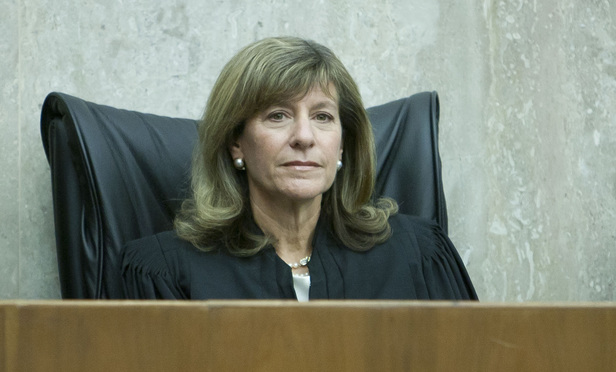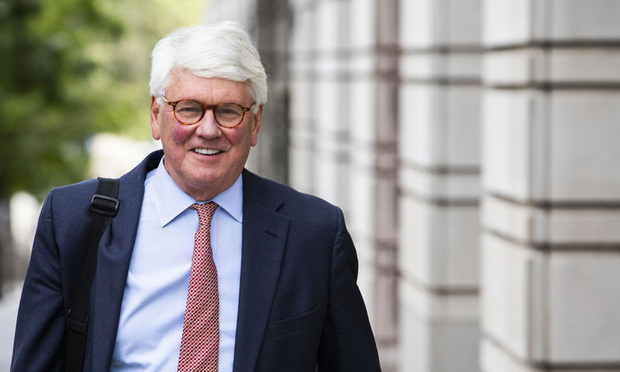Key Mueller Witness Rick Gates Is Sentenced to 3 Years of Probation, 45 Days in Prison
"Your honor, I wish to express to this court that I accept complete responsibility for my actions that have led me here," Gates told U.S. District Judge Amy Jackson in Washington on Tuesday. Gates must serve 45 days in jail intermittently, with his time in confinement coming largely on weekends.
December 17, 2019 at 11:56 AM
7 minute read
 Judge Amy Berman Jackson, U.S. District Court for the District of Columbia. (Photo: Diego M. Radzinschi/ALM)
Judge Amy Berman Jackson, U.S. District Court for the District of Columbia. (Photo: Diego M. Radzinschi/ALM)
Richard Gates, a former deputy chairman on the Trump presidential campaign and a onetime business partner of Paul Manafort, was sentenced Tuesday to three years of probation, with 45 days of "intermittent confinement," after pleading guilty to a raft of crimes and cooperating in some of the highest-profile prosecutions connected to the special counsel's investigation.
Gates had pleaded guilty in February 2018, beginning his new life as a key witness for Robert Mueller III, the appointed special counsel who investigated the Trump campaign's ties to Russia and the president's efforts to impede the inquiry.
In a Washington courtroom last year, District Judge Amy Jackson advised Gates there was no assurance he would receive leniency for his cooperation. Nearly two years after that leap of faith—flipping from a top Trump adviser to key witness—Gates returned to Jackson's courtroom on Tuesday and received some leniency he'd requested.
Gates must serve 45 days in jail intermittently, with his time in confinement coming largely on weekends. Prosecutors had supported Gates' push for probation but had not recommended any incarceration.
"Your honor, I wish to express to this court that I accept complete responsibility for my actions that have led me here," Gates said, in a brief statement. "I greatly regret the mistakes that I have made. And I have worked hard to honor my commitment to make amends. My family and I appreciate your consideration for leniency, and I hope and pray you will give that to me."
For Gates, the sentence marked the culmination of a two-year saga that saw him sit for hundreds of hours of questioning and testify as a star witness in some of the highest-profile prosecutions stemming from Mueller's investigation, including the trial of Manafort.
Jackson, who presided over two of the trials in which Gates testified, commended him Tuesday for his appearances on the stand, saying "he came across to me as extremely candid."
"He didn't appear to embroider the evidence in an effort to advance the government's case," Jackson said. She added that although he was called by prosecutors, Gates "didn't come across as a bought-and-paid-for puppet."
Leading up to Tuesday's sentencing, prosecutors backed Gates' bid for leniency, saying they did not oppose his request for a sentence without prison time. Prosecutor Molly Gaston reiterated Tuesday that the Justice Department did "not oppose" Gates' request to avoid prison time, repeatedly describing his assistance in the course of the investigation as "extraordinary" and noting his testimony in three criminal trials linked to the Mueller probe.
Gaston said Gates "stands out" for agreeing to cooperate with the government in the midst of amid the turbulent atmosphere that surrounded the Mueller investigation. "In the midst of such an environment," she said, Gates "decided to do the right thing."
"Mr. Gates received pressure from Mr. Manafort not to plead, and Mr. Manafort assured that there would be a defense fund if Mr. Gates decided not to plead," she added.
Looking on inside the courtroom were veterans of Mueller's team, including Andrew Weissmann, Greg Andres and Brandon Van Grack, prosecutors who played leading roles in the trial of Manafort. Uzo Asonye, a career federal prosecutor in Alexandria who joined the trial team, also attended Tuesday's proceeding.
Gates' defense lawyer, Sidley Austin senior counsel Thomas Green, suggested Tuesday that the prosecutors attended the sentencing not out of curiosity but recognition of Gates' cooperation. Minutes before the hearing began, Weissmann approached Gates inside the well of the court and shook his hand.
Green said Gates had made an "amazing effort here at redemption and doing the right thing," urging Jackson to "show him leniency and agree that he is worthy of a sentence of probation."
Gates and Manafort were accused in 2017 of financial fraud and other misconduct stemming from their political consulting work for the Russia-aligned government of Ukraine, all of which predated their time on the Trump campaign.
Their indictments featured allegations that they failed to properly disclose their lobbying efforts for Ukraine, ushering in an era of toughened enforcement of the decades-old Foreign Agents Registration Act, or FARA. Since then, the Justice Department has seen a surge of new foreign agent registrations as, with mixed results, it has pursued criminal prosecutions over allegedly unregistered lobbying work for foreign powers.
In 2018, months after reaching his plea deal, Gates took the stand against his longtime business partner in a trial that resulted in an Alexandria, Virginia, jury finding Manafort guilty of bank and tax fraud, along with hiding overseas bank accounts. Manafort is now serving more than seven years in prison.
 Former Obama White House Counsel Gregory Craig leaves federal court in Washington, D.C., on Aug. 22, 2019. (Photo: Diego M. Radzinschi / ALM)
Former Obama White House Counsel Gregory Craig leaves federal court in Washington, D.C., on Aug. 22, 2019. (Photo: Diego M. Radzinschi / ALM)Gates testified recently in the case against Greg Craig, a prominent Washington attorney who was charged with misleading the Justice Department about his past work for Ukraine in what prosecutors characterized as a scheme to avoid registering as a foreign agent. Craig's case spun off of the Mueller investigation, which revisited his communications with the Justice Department as it delved into a report he prepared for Ukraine in 2012 on a controversial prosecution.
Craig was found not guilty in September of misleading the Justice Department about that work, a verdict that dealt a setback to the Justice Department in its crackdown on foreign lobbying.
Gates more recently testified against Roger Stone, the longtime Trump confidante who last month was found guilty of tampering with a witness and lying to Congress about his efforts to learn of hacked Democratic emails during the 2016 presidential election. In some of the most damning testimony of the trial, Gates described how the Trump campaign viewed Stone as a kind of conduit to Wikileaks, the anti-secrecy group implicated in the disclosure of the hacked files.
In their court filing, prosecutors said Gates cooperated in spite of facing a "particularly turbulent environment." Gaston said Gates had been pressured not to testify and had even received "assurances of monetary assistance."
"He should be commended for standing up to provide information and public testimony against individuals such as Manafort, Craig, and Stone, knowing well that they enjoy support from the upper echelons of American politics and society," Gaston told the court.
Read more:
Prosecutors: Mueller Cooperator Deserves Leniency for 'Extraordinary Assistance'
Roger Stone Is Guilty on All Counts, D.C. Jury Concludes
Mueller Cooperator Rick Gates, Awaiting Sentencing, Testifies Against Greg Craig
Ex-Trump Campaign Adviser George Papadopoulos Gets 14-Day Jail Term
Top Trump Campaign Aide Flips, Pleads Guilty in Mueller Probe
This content has been archived. It is available through our partners, LexisNexis® and Bloomberg Law.
To view this content, please continue to their sites.
Not a Lexis Subscriber?
Subscribe Now
Not a Bloomberg Law Subscriber?
Subscribe Now
NOT FOR REPRINT
© 2025 ALM Global, LLC, All Rights Reserved. Request academic re-use from www.copyright.com. All other uses, submit a request to [email protected]. For more information visit Asset & Logo Licensing.
You Might Like
View All
Wells Fargo and Bank of America Agree to Pay Combined $60 Million to Settle SEC Probe

Supreme Court May Limit Federal Prosecutions Over 'Misleading' but True Statements

CFPB Alleges Berkshire Hathaway Subsidiary Originated Unaffordable Housing Loans

Class Certification, Cash-Sweep Cases Among Securities Litigation Trends to Watch in 2025
6 minute readLaw Firms Mentioned
Trending Stories
- 1Paul Hastings, Recruiting From Davis Polk, Continues Finance Practice Build
- 2Chancery: Common Stock Worthless in 'Jacobson v. Akademos' and Transaction Was Entirely Fair
- 3'We Neither Like Nor Dislike the Fifth Circuit'
- 4Local Boutique Expands Significantly, Hiring Litigator Who Won $63M Verdict Against City of Miami Commissioner
- 5Senior Associates' Billing Rates See The Biggest Jump
Who Got The Work
J. Brugh Lower of Gibbons has entered an appearance for industrial equipment supplier Devco Corporation in a pending trademark infringement lawsuit. The suit, accusing the defendant of selling knock-off Graco products, was filed Dec. 18 in New Jersey District Court by Rivkin Radler on behalf of Graco Inc. and Graco Minnesota. The case, assigned to U.S. District Judge Zahid N. Quraishi, is 3:24-cv-11294, Graco Inc. et al v. Devco Corporation.
Who Got The Work
Rebecca Maller-Stein and Kent A. Yalowitz of Arnold & Porter Kaye Scholer have entered their appearances for Hanaco Venture Capital and its executives, Lior Prosor and David Frankel, in a pending securities lawsuit. The action, filed on Dec. 24 in New York Southern District Court by Zell, Aron & Co. on behalf of Goldeneye Advisors, accuses the defendants of negligently and fraudulently managing the plaintiff's $1 million investment. The case, assigned to U.S. District Judge Vernon S. Broderick, is 1:24-cv-09918, Goldeneye Advisors, LLC v. Hanaco Venture Capital, Ltd. et al.
Who Got The Work
Attorneys from A&O Shearman has stepped in as defense counsel for Toronto-Dominion Bank and other defendants in a pending securities class action. The suit, filed Dec. 11 in New York Southern District Court by Bleichmar Fonti & Auld, accuses the defendants of concealing the bank's 'pervasive' deficiencies in regards to its compliance with the Bank Secrecy Act and the quality of its anti-money laundering controls. The case, assigned to U.S. District Judge Arun Subramanian, is 1:24-cv-09445, Gonzalez v. The Toronto-Dominion Bank et al.
Who Got The Work
Crown Castle International, a Pennsylvania company providing shared communications infrastructure, has turned to Luke D. Wolf of Gordon Rees Scully Mansukhani to fend off a pending breach-of-contract lawsuit. The court action, filed Nov. 25 in Michigan Eastern District Court by Hooper Hathaway PC on behalf of The Town Residences LLC, accuses Crown Castle of failing to transfer approximately $30,000 in utility payments from T-Mobile in breach of a roof-top lease and assignment agreement. The case, assigned to U.S. District Judge Susan K. Declercq, is 2:24-cv-13131, The Town Residences LLC v. T-Mobile US, Inc. et al.
Who Got The Work
Wilfred P. Coronato and Daniel M. Schwartz of McCarter & English have stepped in as defense counsel to Electrolux Home Products Inc. in a pending product liability lawsuit. The court action, filed Nov. 26 in New York Eastern District Court by Poulos Lopiccolo PC and Nagel Rice LLP on behalf of David Stern, alleges that the defendant's refrigerators’ drawers and shelving repeatedly break and fall apart within months after purchase. The case, assigned to U.S. District Judge Joan M. Azrack, is 2:24-cv-08204, Stern v. Electrolux Home Products, Inc.
Featured Firms
Law Offices of Gary Martin Hays & Associates, P.C.
(470) 294-1674
Law Offices of Mark E. Salomone
(857) 444-6468
Smith & Hassler
(713) 739-1250










